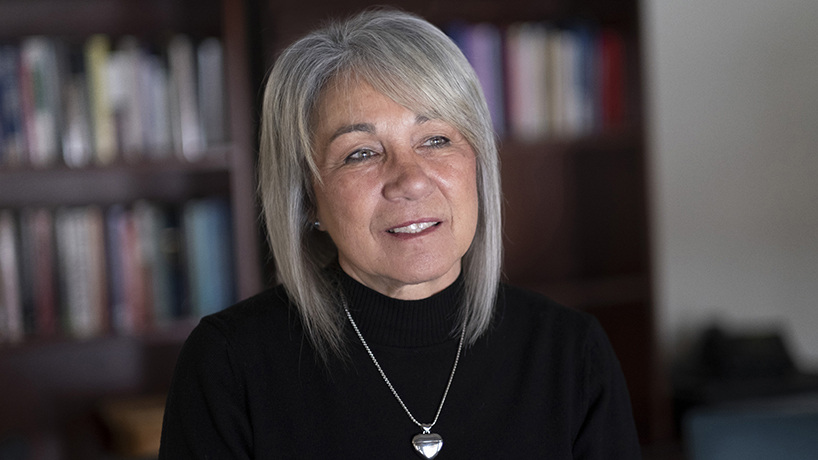
The Donald L. Ross Endowed Chair for Advancing Nursing Practice Roxanne “Annie” Vandermause was named interim dean of the College of Nursing in January. (Photo by August Jennewein)
Donald L. Ross Endowed Chair for Advancing Nursing Practice Roxanne “Annie” Vandermause took the helm in the University of Missouri–St. Louis College of Nursing in January in a new role as interim dean. She comes to the position after five years of progressive responsibility at the college that began with the endowed chair and advanced to encompass directing the PhD program and administering the College of Nursing research office.
In her new role, Vandermause looks forward to steering the college through a period of growth.
“I’m very excited about taking this piece of service on for the university,” she said. “I love our faculty and staff, the programs that we have developed, and I think I can provide some strong leadership to move us into the future.”
On Vandermause’s agenda is strengthening and refining existing programs, with a focus on the BSN and DNP degrees, which underwent curricula changes in the last year. She also hopes to recruit and retain faculty and staff and reinforce ties within the UMSL community and without.
Vandermause sees the College of Nursing’s role in the greater profession as educating the next generation of nurses, contributing to the science of nursing and serving the public by providing nurses to the community and addressing the health-care needs of the region and beyond.
“We are on the cusp of a future in health care that is changing,” she said. “We have many needs and challenges in our society related to health, and nurses are at the center of delivering or orchestrating care, preventing illness and maintaining well-being. In order to take on that large challenge and role, we need to be creative in how we educate. We join other health-care disciplines and professions in that challenge.”
For that Vandermause hopes to take advantage of support from UMSL’s Center for Teaching and Learning and the Office of Research Administration. She also sees a role in University of Missouri System collaboration through the NextGen Precision Health Initiative and points to new shared courses with the University of Missouri–Columbia and University of Missouri–Kansas City.
Collaboration comes naturally to Vandermause after years of experience facilitating relationships. Her endowed chair role deals with partnerships and initiatives across the BJC HealthCare system, and she is also a co-investigator with Missouri Institute of Mental Health Director Robert Paul on a research program aimed at reducing symptoms of anxiety, depression and substance use in Cambodia.
Broadly, her research interests include addictions, mental health, community mental health and community initiatives addressing health-care access. Vandermause uses hermeneutic phenomenological methods – a type of qualitative research that examines and interprets patterns in everyday, open-ended conversations – to study health and well-being.
“It’s a matter of doing detailed work in analyzing language and conversation and is often done in groups,” she said. “It’s a form that uses knowledge that we have and applies it to the everyday lives of people. It’s very relational. It’s very contextual. We’re looking at all influences. It’s very different from the typical scientific method and is along the lines of examining storied accounts, as in the humanities. Hermeneutics began in the humanities as a matter of text interpretation, so I consider it to be a blend of science and humanities.”
Vandermause’s research has been consistently supported by funding from foundations such as the National Institutes of Health, the Patient-Centered Outcomes Research Institute and others.
Over the course of her career, she’s practiced in all areas of health-care delivery as a nurse and previously was on the leadership team in the College of Nursing at Washington State University. Being central to the health and lives of people either, individually or in groups, has been her favorite part of nursing – whether she was directly caring for patients at the bedside or working as an administrator.
“The heart of nursing is improving the health and well-being of society,” Vandermause said. “We’ve got major changes in our health-care system, yet what remains is the role of the nurse, which is to assess and treat the human response to illness and injury. We remain nurses at our core, and we have a language that we speak and understand among ourselves, in all the generations that are currently in practice.”














